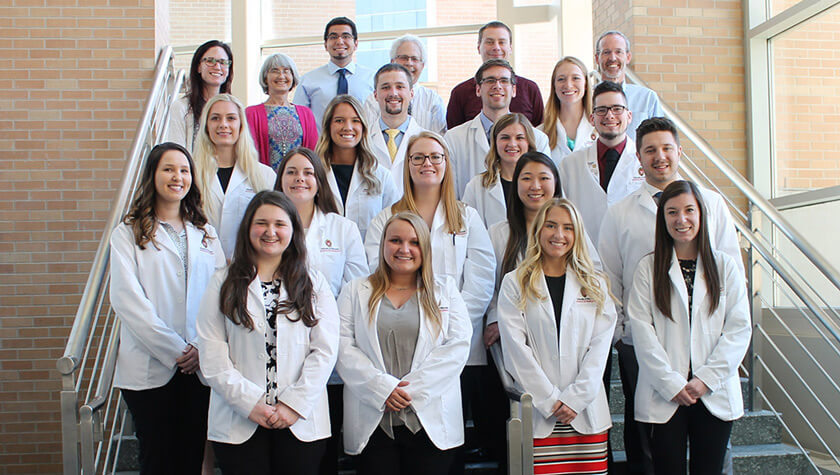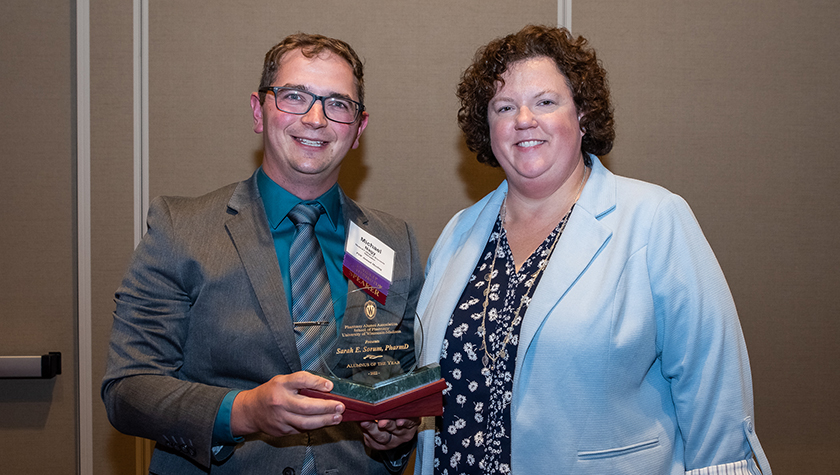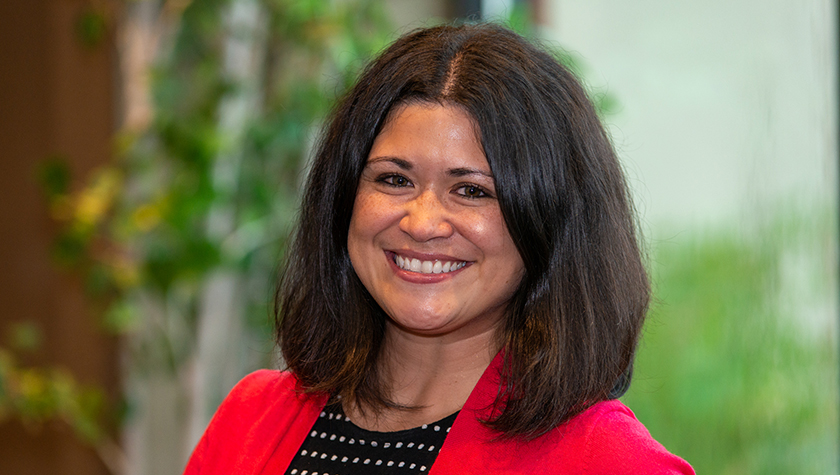
Wopat, ‘ambulatory care practice champion,’ is honored for her servant leadership and contributions to pharmacy education
By Katie Ginder-Vogel
There were four words that changed the trajectory of Maria Wopat’s (PharmD ’10) career: “Don’t close any doors.”
Wopat was still a pharmacy student at the University of Wisconsin–Madison School of Pharmacy when she received that advice from one of her mentors, Professor Beth Martin (BS ’90, MS ’03, PhD ’06), assistant dean for Teaching and Learning and chair of the Pharmacy Practice and Translational Research Division. As a student, Wopat planned to return near her hometown of Ontario, Wisconsin, to practice in an outpatient pharmacy. But all of that changed after Martin’s comment.
“Because of her advice, I became involved in organizations and kept my options open,” says Wopat. “I have no doubt that if she hadn’t said those four tiny words to me, I wouldn’t be where I’m at today.”
Today, Wopat is the PGY1 Pharmacy Residency Program Director at the William S. Middleton Memorial Veterans Hospital, also serving as a clinical pharmacy practitioner on Patient Aligned Care Teams (PACTs).
“She embodies the definition of a servant leader and our choice as 2022 Young Alumnus of the Year.”
—Michael Nagy
Through her time at William S. Middleton, she has worked to advance practice and support new practice models — including the PACT model, which integrates clinical pharmacy practitioners onto teams that also include a primary care provider, registered nurse, licensed practical nurse, and a scheduler to put the patient front and center. The VA’s implementation of the PACT model earned them a Platinum Practice Designation from the VA’s Clinical Pharmacy Practice Office in 2020.
In 2016, Wopat also earned the Distinguished Young Pharmacist Award from the Pharmacy Society of Wisconsin, for whom she co-created and co-leads the Ambulatory Care Advisory Committee. And in 2022, she’s receiving a new honor: the Pharmacy Alumni Association (PAA) Young Alumnus of the Year award.
“Maria is an ambulatory care practice champion through her mentorship with residents and students on rotation and her advisory role with the Wisconsin Society of Pharmacy Students,” says Michael Nagy (PharmD ’16), president of the PAA. “She embodies the definition of a servant leader and our choice as 2022 Young Alumnus of the Year.”
In addition to her continued service to the School of Pharmacy, Wopat also served on the PAA Board of Directors for almost a decade and stays active with the many PAA-sponsored events, such as trivia nights and tailgates.
“Staying connected to the PAA is important to me, as I was fortunate to receive several scholarships while at the School of Pharmacy, and I want to ensure that I continue helping make scholarships available for students,” says Wopat. “It’s an honor to be recognized for being involved with an organization that I love and would be a part of even without the recognition.”
Serving veterans
Wopat first joined the William S. Middleton Memorial Veterans Hospital as a resident, completing both her PGY1 and PGY2 residencies there before joining the team as a tobacco cessation coordinator and clinical pharmacist.
As she ascended to clinical pharmacy practitioner and ultimately PGY1 pharmacy residency program director, she maintained her interest in tobacco cessation. She co-authored a chapter on the topic with Martin, for inclusion in the 18th, 19th, and 20th editions of the Handbook of Nonprescription Drugs: An Interactive Approach to Self-Care, published by the American Pharmacists Association (APhA).
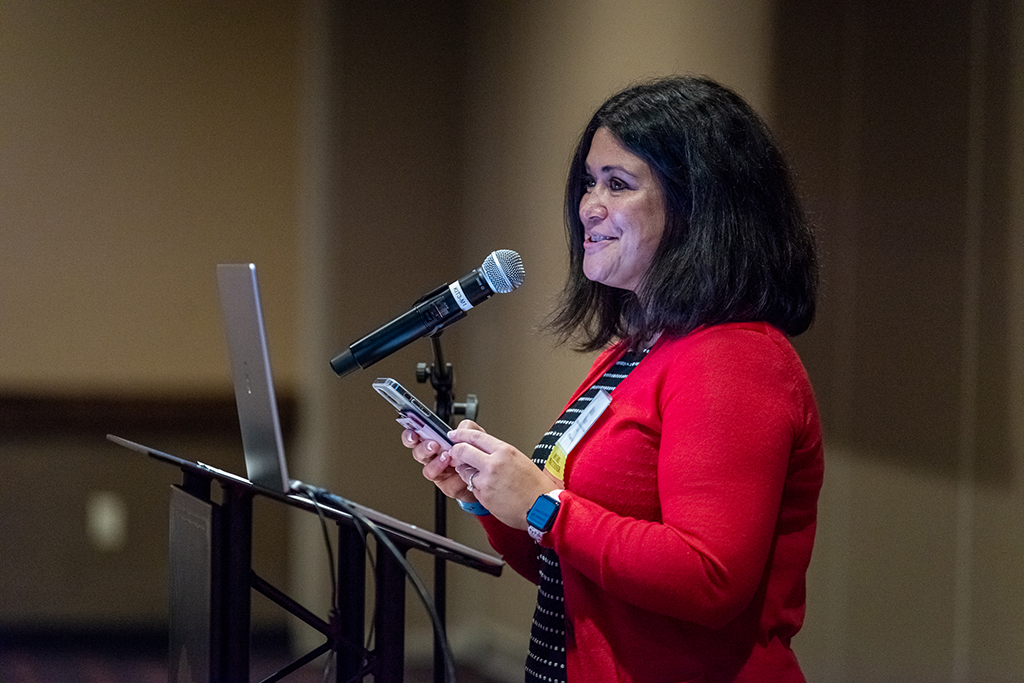
“That’s something I never dreamed I would be able to do,” says Wopat. “But it was made possible by those four words shared with me by Professor Beth Martin.”
Wopat continues to share that same advice — “don’t close any doors” — with the residents she supervises, as well as the School’s PharmD students that she precepts during their fourth-year Advanced Pharmacy Practice Experience (APPE) rotations.
“I love teaching and find it to be very rewarding and a vital part of my practice,” she says.
As a clinical pharmacy practitioner at the William S. Middleton Memorial Veterans Hospital, where she also completed her PGY1 and PGY2 residencies, Wopat works with four primary care providers in the PACT model to provide direct patient care to 50 to 60 patients each week by appointment, serving a total of about 3,600 patients and helping them manage chronic medical conditions.
“I love the ability to meet with patients in the clinic setting and adjust their medications, order follow-up labs, and refer to other services as needed,” says Wopat.
“Change is the only thing in this life that is inevitable. And the quicker you are to accept it, the happier you and those around you will be.”
—Maria Wopat
She often falls back on a skill she studied hard as a student at the School: SOAP notes. SOAP (Subjective, Objective, Assessment, and Plan) is an acronym for the documentation method used by many healthcare providers that provides a way for healthcare professionals to provide structured, organized documentation of the care they provided to a patient.
“I tell students all the time that while the process may seem painful while you’re in it, UW students graduate with a solid foundation in how to write SOAP notes, which in my practice, is very important,” she says. “As a residency program director, I can easily pick out who has had exceptional training in writing SOAP notes, and the UW tops the list.”
Always a Badger
Wopat’s deep love for UW–Madison has kept her connected with the PAA and the School of Pharmacy. As Nagy mentions, she is an advisor for the Wisconsin Society of Pharmacy Students, which is the School’s chapter of the APhA Academy of Student Pharmacists. She also precepts the School’s APPE students and helped Ed Portillo (PharmD ’14), assistant professor in the Pharmacy Practice and Translational Research Division, develop the Practice Innovations course, which is core to the School’s recently added Rural Health PharmD option.
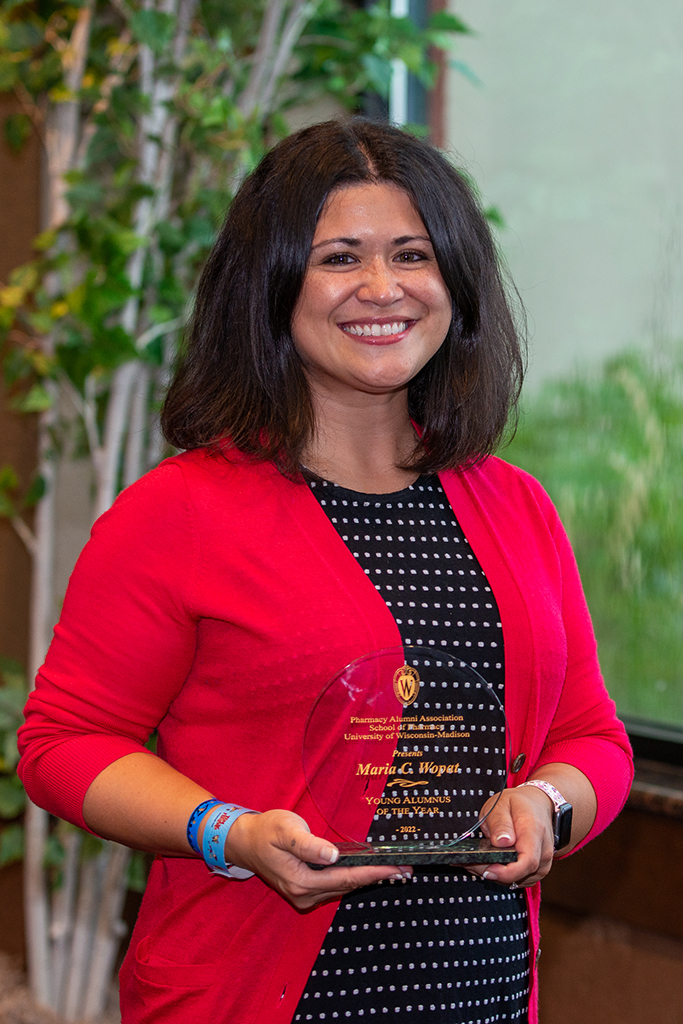
“Her work on this course exemplifies the Wisconsin Idea,” says Nagy. “Since its inception, she has closely mentored more than a dozen students who worked on projects that involved direct patient care and outreach to veterans. Year after year, student pharmacists comment on the impact this course has had on their career path.”
Wopat’s dedication to PAA, the School of Pharmacy, and to student pharmacists is also evident in the way she participates in the School of Pharmacy’s annual White Coat Ceremony for first-year PharmD students.
“Every year, I volunteer to write a note for a first-year student who will be receiving their white coat,” Wopat says. Wopat’s letter, placed in the pocket of PharmD students’ white coats, encourages them to never close any doors, network like it’s going out of style, ask questions, find a mentor, and not fear change.
“Change is the only thing in this life that is inevitable,” says Wopat. “And the quicker you are to accept it, the happier you and those around you will be.”
When she reflects on her time at the School of Pharmacy and her Pharmacy Badger peers, Wopat is enthusiastic.
“I have great memories of my time at the School of Pharmacy,” she says. “The Class of 2010 is filled with phenomenal individuals who have gone on to do amazing things — I am proud to be part of that class.”
